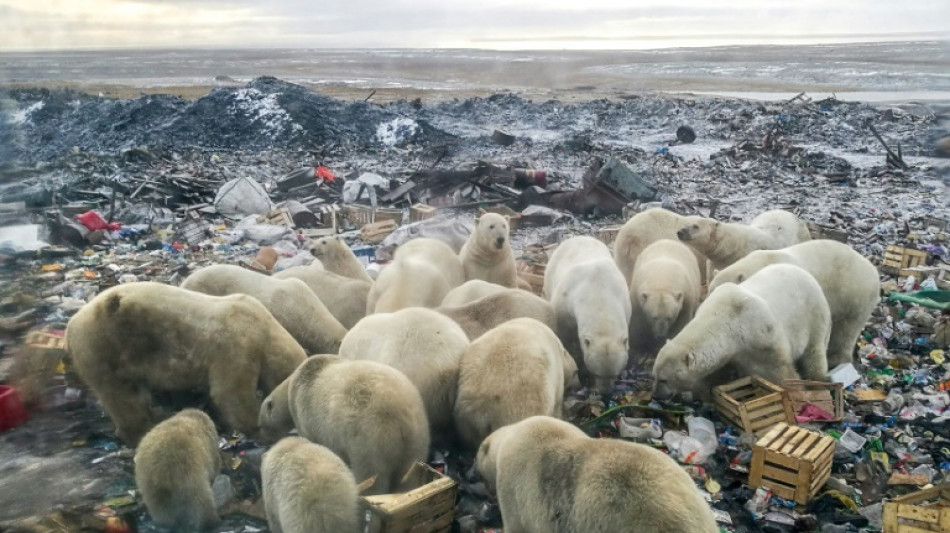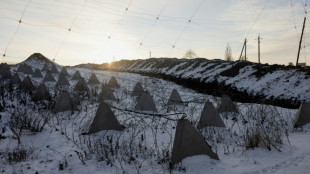
-
 Gu reaches Olympic halfpipe final after horror crash mars qualifiers
Gu reaches Olympic halfpipe final after horror crash mars qualifiers
-
Keller overtime strike gives USA Olympic women's ice hockey gold

-
 NASA delivers harsh assessment of botched Boeing Starliner test flight
NASA delivers harsh assessment of botched Boeing Starliner test flight
-
US Fed Governor Miran scales back call for rate cuts this year

-
 Gu qualifies for Olympic halfpipe final marred by horror crash
Gu qualifies for Olympic halfpipe final marred by horror crash
-
Trump issues Iran with ultimatum as US ramps up military presence

-
 Peru's brand-new president under fire for child sex comments
Peru's brand-new president under fire for child sex comments
-
UK police hold ex-prince Andrew for hours in unprecedented blow

-
 Former Olympic freeski halfpipe champion Sharpe crashes heavily
Former Olympic freeski halfpipe champion Sharpe crashes heavily
-
Former Olympic champion Sharpe suffers heavy halfpipe crash

-
 Belarus says US failed to issue visas for 'Board of Peace' meeting
Belarus says US failed to issue visas for 'Board of Peace' meeting
-
Forest boss Pereira makes perfect start with Fenerbahce rout in Europa play-offs

-
 Alcaraz fights back to book last four berth in Qatar
Alcaraz fights back to book last four berth in Qatar
-
England captain Itoje warns of 'corrosive' social media after abuse of Ireland's Edogbo

-
 War-weary Sudanese celebrate as Ramadan returns to Khartoum
War-weary Sudanese celebrate as Ramadan returns to Khartoum
-
Townsend expects recalled Scotland duo to shine in Six Nations clash with Wales

-
 Peru's new president under fire for child sex comments
Peru's new president under fire for child sex comments
-
UK king opens London fashion week despite brother's arrest

-
 Belarus frees opposition politician Statkevich
Belarus frees opposition politician Statkevich
-
Striking Argentine workers slow down Buenos Aires in protest over labor reforms

-
 Starlink loss a blow to Russian forces in Ukraine: experts
Starlink loss a blow to Russian forces in Ukraine: experts
-
UN's Sudan probe finds 'hallmarks of genocide' in El-Fasher

-
 Belarus frees opposition politician Statkevich: wife
Belarus frees opposition politician Statkevich: wife
-
Rocket re-entry pollution measured in atmosphere for first time

-
 Airbus ready to build two new European fighters if countries want
Airbus ready to build two new European fighters if countries want
-
Canada makes push to attract skilled migrants, including for defence

-
 US threatens to leave IEA if net zero focus remains
US threatens to leave IEA if net zero focus remains
-
Walmart outlines big AI ambitions as it reports mixed results

-
 Trump kicks off his 'Board of Peace,' as war clouds loom on Iran
Trump kicks off his 'Board of Peace,' as war clouds loom on Iran
-
UK pubs to stay open late if home nations reach World Cup knockouts

-
 TotalEnergies in high-stakes French trial over climate change
TotalEnergies in high-stakes French trial over climate change
-
Bosnia probes fascist salutes at Croatian singer's concert

-
 US and Israel issue dire warnings to Iran alongside US military buildup
US and Israel issue dire warnings to Iran alongside US military buildup
-
British public cheer Andrew's arrest with a smile and relief

-
 Argentine workers go on strike to protest Milei's labor reforms
Argentine workers go on strike to protest Milei's labor reforms
-
Nakai targets Olympic skating upset as 'skimo' makes debut

-
 What we know about ex-prince Andrew's friendship with Epstein
What we know about ex-prince Andrew's friendship with Epstein
-
US trade deficit in goods widens to new record in 2025

-
 Oil extends gains on US-Iran tensions, stocks retreat
Oil extends gains on US-Iran tensions, stocks retreat
-
Williams 'on the back foot' after missing Barcelona: Albon

-
 Real Madrid submit evidence to UEFA in Vinicius racism probe
Real Madrid submit evidence to UEFA in Vinicius racism probe
-
Olympics rev up Milan's renewal but locals fear price to pay

-
 Cardona Coll, Fatton win Olympic-debuting ski mountaineering sprint golds
Cardona Coll, Fatton win Olympic-debuting ski mountaineering sprint golds
-
MSF will keep operating in Gaza 'as long as we can': mission head

-
 Russian Filippov wins first medal at Milan-Cortina Games for individual neutral athletes
Russian Filippov wins first medal at Milan-Cortina Games for individual neutral athletes
-
Italian Milan takes sprint honours at UAE Tour

-
 Dozens killed in jihadist attacks in northwest Nigeria
Dozens killed in jihadist attacks in northwest Nigeria
-
Zimbabwe unbeaten in T20 World Cup after six-wicket Sri Lanka win

-
 Postecoglou admits taking Nottingham Forest post a 'bad decision'
Postecoglou admits taking Nottingham Forest post a 'bad decision'
-
Switzerland's Fatton wins women's ski mountaineering sprint on Olympic debut


Human food waste 'threat' to polar bears: report
The invasion of a remote Russian village by dozens of ravenous polar bears three years ago captured headlines around the world, with images of groups of animals gorging on rubbish in an open garbage dump.
Scientists and conservationists warned Wednesday that it was just one of a growing number of incidents showing the threat food waste poses to the at-risk animals.
Polar bears are acutely threatened by climate change, with the Arctic region warming about three times faster than the global average, meaning there is less sea ice that the animals rely on to hunt for food.
"We've been seeing this slow and steady increase in negative human polar bear interactions, fuelled largely by loss of sea ice pushing more bears onshore for longer periods and in more places," said Geoff York, Senior Director of Conservation at Polar Bears International.
In the new analysis, researchers looked at how discarded food, particularly in garbage dumps, is drawing polar bears towards human communities and into danger.
"We know from the brown and black bear world in Europe and North America that dumps are a huge problem for bears. Human food is a huge problem for bears," said York, who co-authored the report in the conservation journal Oryx.
"It's likely to get worse if it's not addressed."
- Eating plastic -
The report draws together a number of case studies in recent years and calls for greater awareness of the risks and better waste management in Arctic communities.
These include isolated incidents where one or two bears approached villages or encampments -- sometimes being shot after attacking local people -- and much larger congregations.
In Kaktovik, Alaska, the protected beach dumping site for the remnants of bowhead whales, which the Inupiat community has traditionally hunted, attracts as many as 90 polar bears from up to 160 kilometres (a hundred miles) each autumn.
The authors said the dramatic scenes in the Russian village of Belushya Guba in 2019, where more than 50 bears were drawn to an open dump on a bad ice year, were an extreme example of what can happen when sites are left unsecured.
Polar bears have evolved to eat a high fat diet, so that the weight they put on in the spring when they hunt ice seal pups will last them much of the rest of the year.
But with ice melting earlier in this crucial period, York said bears are now sometimes returning to shore without having put on enough weight and even those that do return well fed are staying on land for longer.
In this case an accessible rubbish dump can present a "bonanza of calories", he said, although dramatically less nourishing than their normal diet.
"What they don't know is they're also ingesting plastics, they're ingesting toxic materials that are also in the landfill," said York.
He added that there was also a disease risk from garbage like cat food as well as proximity to humans and other animals at the dumps.
- Uncertain future -
York said communities in the Arctic region were faced with steep costs for dealing with household waste, because the frozen and rocky ground offers limited options for landfill.
Dumping or low temperature burning are often used, but he said high temperature burning could be a better, if imperfect, approach.
Meanwhile some communities have formed patrols to chase bears from landfill sites before they get a taste for human food.
Other ideas the authors put forward include education around the issue, and the use of non-lethal deterrents like air horns and electric fences.
Given the significant threat posed to polar bears by climate change, is it worth bothering about the risks from food waste?
"I say yes, because every bear matters, especially as we're starting to see declining populations," he said.
"We have solutions. So let's do what we can while we can and make sure they have the best ride possible as they're heading into this uncertain future."
Ch.Havering--AMWN


